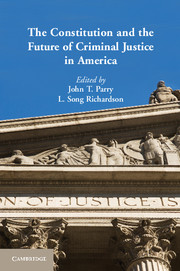Book contents
- Frontmatter
- Contents
- Contributors
- Acknowledgments
- Introduction
- Part I Foundations – The Scope of Criminal Law and Access to Counsel
- Part II Race and Criminal Procedure
- Part III Policing and Privacy
- Part IV Technology and the Surveillance Society
- Part V Confessions and miranda
- Part VI Conviction, Sentencing, and Incarceration
- Part VII Emergencies and Borders – Immigration, Terrorism, National Security, and Transnational Crime
- 14 Preemption and Proportionality in State and Local Crimmigration Law
- 15 Embattled Paradigms
- 16 The Civilianization of Military Jurisdiction
- 17 Crime across Borders
- Index
- References
17 - Crime across Borders
Globalization, Executive Power, and the Transformation of Criminal Justice
Published online by Cambridge University Press: 05 June 2014
- Frontmatter
- Contents
- Contributors
- Acknowledgments
- Introduction
- Part I Foundations – The Scope of Criminal Law and Access to Counsel
- Part II Race and Criminal Procedure
- Part III Policing and Privacy
- Part IV Technology and the Surveillance Society
- Part V Confessions and miranda
- Part VI Conviction, Sentencing, and Incarceration
- Part VII Emergencies and Borders – Immigration, Terrorism, National Security, and Transnational Crime
- 14 Preemption and Proportionality in State and Local Crimmigration Law
- 15 Embattled Paradigms
- 16 The Civilianization of Military Jurisdiction
- 17 Crime across Borders
- Index
- References
Summary
In recent years, criminal activity and criminal enforcement efforts have become increasingly transnational and international. This chapter considers these developments alongside the rise of what I call the “national security sovereign” in the United States. I use the term “national security sovereign” to refer, not to a unitary sovereign with power over all aspects of political life, but rather to a federal executive branch with enormous power and discretion over the movements, well-being, and lives of people around the world. This power is so extensive and so independent that it transcends ordinary ideas of executive power in a democratic regime of divided sovereignty and deserves to be treated as a distinct manifestation of sovereignty in a Schmittian sense. The national security sovereign justifies its power through the necessity of managing events – sometimes denominated “crises” – that impact anything that can be classified as a national security concern, as well as, more generally, the ever-present need to advance national security interests. I argue that the rise of the national security sovereign will present growing challenges to criminal justice and criminal practice in the years ahead, particularly but not exclusively at the federal level.
Many aspects of the national security sovereign are reasonable, and some may even be desirable. Nonetheless, the national security sovereign puts pressure on traditional separation of powers and rule of law values. While it is true that these values have never matched up completely with actual practices, they have overlapped enough that it has made sense to use them as normative standards or analytical tools. As the national security sovereign grows, however, the widening gap between these values and actual practice threatens to make such comparisons meaningless. Nor is this threat confined to the international or foreign relations aspects of criminal law. This chapter, accordingly, argues that judges, legislators, and commentators must make a self-conscious doctrinal and political effort to restrain the national security sovereign in the field of criminal law, and elsewhere.
- Type
- Chapter
- Information
- The Constitution and the Future of Criminal Justice in America , pp. 310 - 332Publisher: Cambridge University PressPrint publication year: 2013



